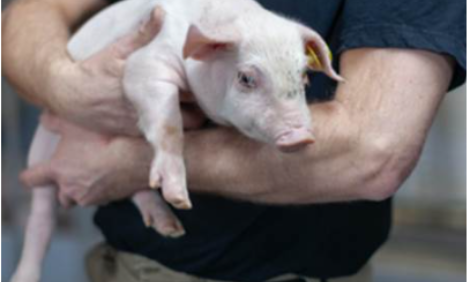



Research Paves the Way for Improved Animal Health and Productivity
Understanding how inherited characteristics relate to specific genomes will eventually allow researchers to develop tools that can be used to guide animal breeding, selection and management decisions, writes Laura McGinnis and colleagues at the ARS.Throughout the United States, ongoing Agricultural Research Service (ARS) research projects are changing the way industry members breed, raise and produce the nation’s most valuable agricultural animals.
The Next Pig Thing

A farmer in Iowa wants to breed pigs that will produce lean, tender meat. An animal health inspector in North Carolina wants to identify the origin of a contagious virus that has spread throughout the state. A consumer advocacy group in California wants to verify the labeling accuracy of name-brand pork products available at local stores. Recent advances in swine genomic research mean that such goals are easier to achieve than ever before.
Scientists at the US Meat Animal Research Center (USMARC) are collaborating with an international coalition of researchers to sequence the swine genome. This has led to expansion of publicly available DNA-based tools, which are facilitating improved production efficiency and animal health.
The coalition—the Swine Genome Sequencing Consortium (SGSC)—includes ARS; the USDA Cooperative State Research, Education, and Extension Service; the University of Illinois; the Alliance for Animal Genomics; England’s Wellcome Trust Sanger Institute; Scotland’s Roslin Institute; the Korean Livestock Institute; the Beijing Genome Institute; Iowa State University; North Carolina State University; the National Park Board; North Carolina Pork Producers; France’s National Institute for Agricultural Research, and many other organizations.
Since its inception in 2003, the SGSC has pieced together more than 267,000 segments across all pig chromosomes. This information can be viewed at http://pre.ensembl.org/Sus_scrofa/index.html.
“USMARC scientists have led the field in developing publicly available single nucleotide polymorphism (SNP) markers,” says animal geneticist Gary Rohrer, who’s leading the ARS swine genome research efforts.
He and his colleagues at USMARC, the University of Illinois, Iowa State University, and the National Pork Board are developing a SNP chip similar to one being developed for cattle. Though the swine genome hasn’t been completely sequenced, the researchers have developed markers that enable them to identify individuals, determine parentage and predict offspring performance.
ARS researchers have made many contributions to the international scientific community’s understanding of livestock genomics. Their continuing input to this ever-expanding body of knowledge will have benefits for agriculture throughout the world.
— By Laura McGinnis, Sharon Durham, Ann Perry, Jan Suszkiw and Don Comis, Agricultural Research Service Information Staff.
August 2008








